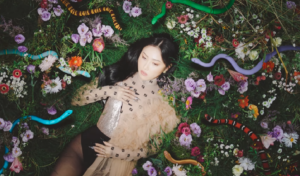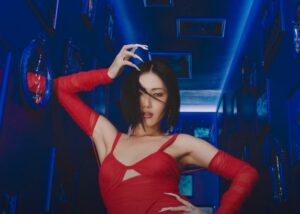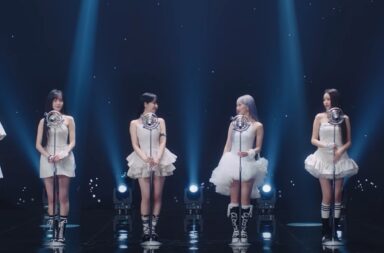
In her solo endeavors, Mamamoo’s Hwasa has always been willing to lean into the personal, specifically in how being famous affects not only one’s life, but one’s ability to live that life. Her new solo track, “I’m A B”, dives into how the stress of her life as a performer has affected her interpersonal relationships.. On the surface, “I’m A B” seems to lean into the interpretation of “bitch” as a symbol of female empowerment. Yet, the song undercuts itself by trying to temper the very attitude Hwasa claims to own.
“I’m a B” opens with Hwasa in a box filled with water, which she breaks out of. This is clearly a rebirth; Hwasa coming from a dark, cramped, watery space and into the light. She cautiously inches forwards, and opens a door to a strange new world — and also to the 90s. Specifically, the turn of the millennium.
Every element of “I’m A B” has a line drawn straight to that very late 90s/very early 2000s era of music. The styling is baggy jeans and bandeau tops, wuxia-inspired looks, and a diamond bodysuit that recalls “Toxic”. She has ultralong fingernails, and works them in such a way it brings to mind Lee Jung-hyun’s hit “Wa”. It gives Hwasa power by mixing the homage with the flex: as she adopts these trappings of those who came before her, she makes them completely her own. As much as you know you’ve seen these elements before, it is difficult to place them because Hwasa has such confidence and authority that it erases anything else.
The shooting techniques also mirror the styles of the 90s. Most blatant is the heavy usage of fisheye lenses. Commonly associated with the works of Hype Williams, the image of the distorted musician, is not only quintessentially 90s, but uniquely– it died and never came back. So, Hwasa’s choice to revive them is quite telling. The sets also recall some of the bigger hits of that era. For example, the saturated colors of her boxed sets are similar to “Say My Name” by Destiny’s Child. Even the mid-song breakdown on a gayageum has a distinctly turn of the millennium feel, something that was done long ago when MVs were events to be anticipated, rather than an on-demand expectation.
This leaning on the 90s fits as “I’m A B” mirrors this era in two ways. The more obvious is that “I’m A B” draws from this time musically; girl group R&B in particular. It’s low and slow, placing Hwasa’s slick, melismatic vocals at the front of the mix. The rubbery, bass-based instrumentals are just there to give her something to bounce off and provide a darker undertone; it’s’ completely Hwasa’s show.

The other parallel to this era is the theme. The 90s saw the explosion of “girl power” as a concept, and alongside came a slew of female artists who cultivated images of calm and collected authority. Destiny’s Child is the big one, though others like TLC and En Vogue used it first. This was the decade which saw the reappropriation of “bitch” from something purely pejorative to something aspirational– if a bitch is strong, confident, independant, doesn’t care about what anyone says and will not put up with bullshit, why is it bad to be one?
Twenty years later, the word has been through the wringer and can have many meanings depending solely on context, but this is when the idea of “Yeah, I’m a bitch. And?” really took off in mainstream culture. Given that that attitude is the core of “I’m A B”, it makes sense for Hwasa to utilize it. Even the ending shot leans into this. She is in a field of flowers, approached by several snakes; the Eve imagery is not hard to see. Yet rather than her being manipulated by them, Hwasa gives an arrogant smile, implying she’s in control of them. Freed from the typical female expectations of passivity and sweetness, she is able to control that which even God cannot.
But something about “I’m A B” does not quite click. Her performance is understated, and lacks the confidence needed to push a song like this over the edge. Hwasa has stated that she penned the track as an apology to her loved ones. She described her own behavior as “hysterical and overly sensitive”, and that she attempted to use the track to express her guilt over treating those close to her poorly. There are two major issues this creates. The first is that it completely undercuts the song, by immediately re-contextualizing “bitch” from aspirational to an accurately unpleasant description. The other is that “I’m A B” is a terrible apology.

Throughout the track, Hwasa seems to relish in her behavior. She ping-pongs emotionally, shifting from exuberant highs to despondent lows in a line. She describes her sins as beautiful, and herself as savage and crazy. Even on the bridges, as she feels frustrated and trapped, trying to get her thoughts out, but it happens via verbal lash and the return to the familiar phrase “excuse you, I’m a bitch”. She presents herself, in all this chaotic, resolute glory, as immutable. She is a bitch, end of discussion. Which is good for a track that frames this as throwing off sexist expectations of behavior, but not an apology.
This is not “I’m sorry I treated you badly”, it’s “I’m sorry that you got offended when I treated you badly”. There is no contrition in “I’m A B”; nor any sense of guilt. If pressed, the best word to describe Hwasa’s performance is “unapologetic”. If she owned her attitude the way the MV tries to convince the audience she does, then it would be her putting her cards on the table– she’s a bitch, take it or leave it. But this puts a bad taste in the audience’s mouth; making it clear she knows she’s awful to be around and she’s sorry, but not sorry enough to stop. Even when she switches up the final chorus to “I’m a light”, she doesn’t change anything else; instead expecting others to alter their perceptions.
At the end of the day, the person who owns their bad qualities is usually more tolerable than the one who feigns regret but never actually tries to change. If Hwasa had been the former, there’s very little that could hold “I’m A B” back. But by leaning into the latter, it gives the whole track this unpleasantly selfish undercurrent that sours the whole thing.
(Images via RBW, Youtube, Lyrics via Kgasa, The Korea Times)


